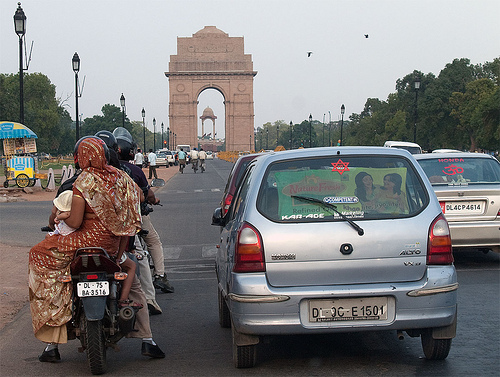

She ducks into a toilet stall on the platform and remerges a few moments later, transformed in a sari with vermillion powder on her forehead, and red and white conch bangles on her wrists – the symbols of a traditional, married Hindu woman.
Ms Begum is one of a number of India’s 150 million Muslims who adopt Hindu identities to avoid discrimination in the workplace.
“For the the whole day I shall maintain this Hindu appearance. My name is Laxmi, you know it’s also the name of the Hindu goddess,” she says.
“Before leaving home I took off my armband on which ‘Allah’ is embossed and put on whatever a Hindu woman usually wears. I live in a Muslim village. Villagers will feel bad to see me with the symbols of a Hindu woman.”
Ms Begum says she tried unsuccessfully to find a job for many years before deciding to hide her Muslim identity. Posing as a Hindu woman, she got her current job as an ayah (nursemaid) in a private hospital.
“Recently my hospital asked me to look for some girls to work there, but they asked me not to bring any Muslim candidate for the interview. If by chance they get to know that I am Muslim, I am sure I will be fired.”
Secret recruitment policies
Muslims who adopt fake Hindu identities mostly work in menial jobs in sectors where identity documents are not usually sought.
Barin Ghosh managed a domestic help and ayah supply agency in Kolkata until recently and says many recruitment agencies help Muslims find jobs by introducing them as Hindu.
“Almost 95 percent of the clients in my agency were Hindu and while seeking domestic helps, as much as 80 per centof the Hindu clients informed us that they would not employ any Muslims,” Mr Ghosh says.
“Muslims being poorer, more than half of the jobseekers coming to our agency were from this minority community. Sometimes we introduced Muslim jobseekers as Hindus to our Hindu clients and they got the jobs. I am sure many placement agencies on mutual interest maintain such secret policies to help Muslims get jobs.”
Anti-Muslim bias
Muslims make up 13 percent of India’s population and are the country’s largest minority.
However, community leaders have long alleged that an anti-Muslim bias exists in different levels of society.
In 2005, the government appointed the Sachar Commission to investigate suggestions that Muslims were disadvantaged in social, economic and educational terms.
It concluded that the socioeconomic condition of most Muslims was worse than that of the dalits, or ‘untouchables’, the lowest of the Hindu castes.
Ayesha Pervez, a minority rights activist, says widespread workplace discrimination means Muslims are unable to upgrade their standard of living.
“It’s not just in the unorganised sector where Muslim jobseekers face the hurdle of discrimination. Even in the government sector anti-Muslim discriminatory processes are thriving,” she says.
“In West Bengal where Muslims constitute 27 percent of the population, their representation in government jobs is as low as four percent. Muslim participation is also extremely low in the private sector.”
Muslims as untouchables
According to Prasenjit Biswas, a professor of philosophy at the North Eastern Hill University in Meghalaya, many Hindus count Muslims as untouchables.
He says that is at the root of the anti-Muslim discrimination in India.
“The anti-Muslim bias arises out of caste Hindu mindset of untouchability that considers Muslims as lesser than even the untouchables,” he says.
“The specific reason in eastern India is the deep-seated fear that the proximity of Muslims in the interior household will not only pollute the household but would bring in bad omen.”
Prof Biswas says although discriminating against Muslims is illegal, it is almost impossible for those affected to provide proof.
“So, they are forced to bear with this repressive system- in many cases by disguising themselves as Hindus, in attempt to seek work and live as equals in the society.”



